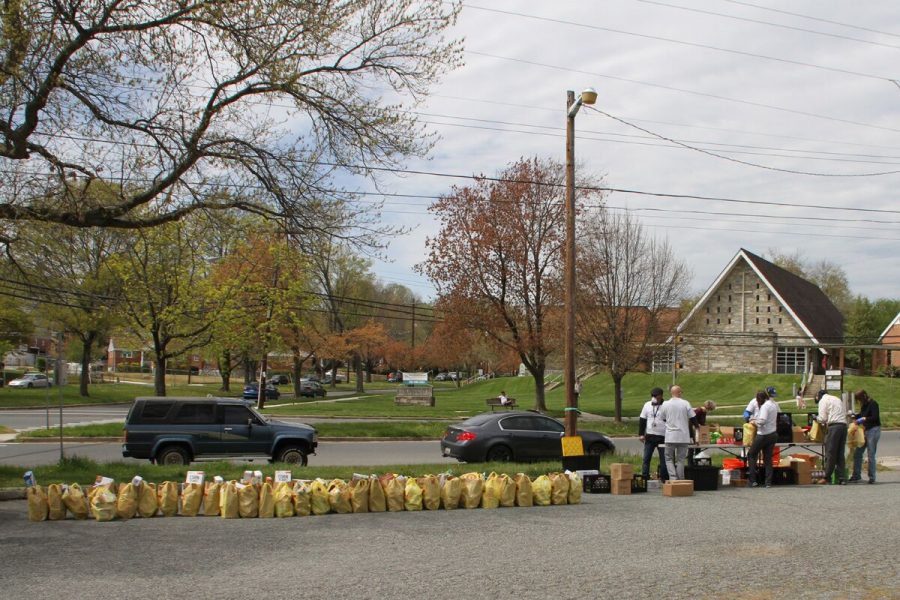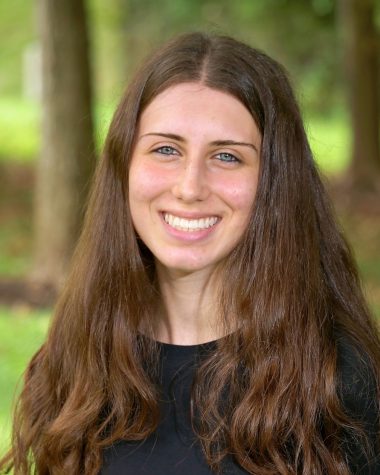Mobile food pantry helps families during pandemic
photo courtesy of Betsy Binckes
The mobile food pantry takes place on a Sunday afternoon.
December 10, 2020
It’s 2 p.m. on a rainy Sunday afternoon, and Betsy Binckes, President of the Board for Mid-County United Ministries (MUM), is reminding volunteers at the mobile food pantry to maintain social distancing. Tents and tarps are set up to make sure the food they are preparing does not get wet.
MUM is a 501(c)3 non-profit organization that offers their mobile food pantry at different locations each Sunday in Montgomery County. In the month of August alone, their food pantry helped close to 600 families, averaged 150-200 clients at each location, and gave out 26,000 pounds of food. Prior to COVID, that amount of food would have lasted them several months.
Usually on a day like this, MUM would not have to worry about their food getting exposed to the elements seeing that their food pantry, which prior to COVID was set in Wheaton, is in an indoor building. However, because of the new COVID protocols, MUM is required to have their food pantries outside, where the spread of the coronavirus is less likely.
“We take very seriously the COVID protocols,” Binckes said. “We feel that we have to keep the clients safe but we also have to keep our volunteers safe.”
Volunteers are required to wear masks, gloves and they have to take surveys that ask if they have been in close contact with anyone who has tested positive. MUM’s staff checks everyone’s temperature and provides masks for clients who did not bring their own.
“Prior to COVID, we were a choice pantry, meaning clients can come in and decide what type of food they wanted,” said Derrick Owens, the Vice President of the Board. “Unfortunately with COVID we had to do away with being [a] choice [pantry] because we wanted to minimize the amount of time [clients] were going through the line to pick up the food.”
This was only one of the many changes MUM has seen in their organization since the pandemic hit. A once small “mom and pop” organization has seen almost a 300 percent increase in serving people and an increase in volunteers as well.
“I can tell you that if we didn’t have the volunteers coming we couldn’t pull it off,” Binckes said. “That’s for darn sure.”
Fernando Miranda, a regular volunteer at MUM, is responsible for intake, which is the process of registering new clients. He asks for details like their names, birthdates, addresses and family members.
“I am kind of like the 411,” Miranda said. “The majority of [clients] are Spanish speakers, so I am the point of reference for a lot of information.”
Miranda said sometimes intake was overwhelming, especially if he was the only one doing it, but recently as more volunteers have shown up, it’s been easier.
This is not the only challenge MUM has had to overcome. When the pandemic first hit, they underestimated how many people would show up needing food and ended up having to turn people away.
“That was a quick learning point for us,” Owens said. “It was like ‘okay, this is definitely going to be much bigger than what we all anticipated.’”
MUM is continuing to overcome new challenges that arise from COVID-19, and are determined to keep helping their clients.
“We are anticipating a second wave coming in and that is going to impact the food supply chain,” Binckes said. “That is why right now we are scrambling to buy as much food as we can and shove it into our storage unit so that we can continue to serve people.”








